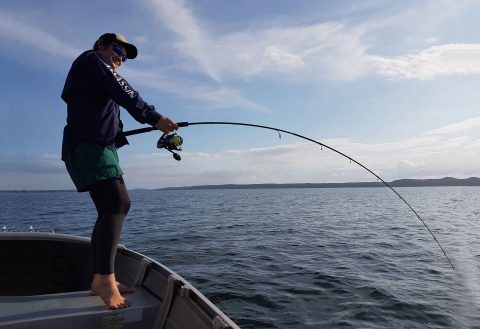Food Basket
A Fish Fight In Hout Bay
Small-town fishermen along the coast of South Africa have long relied on the ocean for their livelihoods. In Hangberg, a fishing community situated in the wealthy and picturesque town of Hout Bay in the Western Cape, protests have recently erupted, with many citing proposed fishing restrictions as the cause.
The Department of Agriculture, Forestry and Fisheries (DAFF) annually reviews the Total Allowable Catch (TAC) for West Coast rock lobster. This year it was recommended that the number be reduced from the previous season, a recommendation that has not been well received by locals.
The DAFF has called the resultant protests and increasing tensions, supposedly based on a reduced TAC, “misplaced and misguided”, bearing in mind that the total allowable catch has yet to be decided on.
Residents in the area feel that these proposed restrictions will be the straw that breaks their backs. This has less to do with the annually reviewed allowable catch, and more to do with the department proposing changes to the Fishing Rights Allocation Process.
Residents fear that these changes would place restrictions on the informal nearshore fishing sector, an unofficial activity that many depend on for their livelihood. Scratch the surface and you’ll find that the tensions in Hangberg have been growing for some time now, since 2006 in fact.
By land and by sea
The communities of Hangberg and nearby Imizamo Yethu are also fed up with the length of time it has taken government to institute new policies and procedures. And activists such as Donovan van der Heyden feel that even when government does consult the communities it doesn’t take their opinions into account.
“When government comes and consults, we give them our thoughts but then when we get the policies back, it’s very different to what we discussed,” he says.
With regards to fishing, he says that an interim plan drawn up in 2007, while the Policy for Small Scale Fisheries was being drafted, is still in effect. The community feels that the provisional plan distributes marine resources unfairly. “Implementation of the policy [for Small Scale Fisheries] has been postponed,” he says. “The interim policy was never meant to be a long-term solution.”
Van der Heyden says that even processes such as Operation Phakisa, set up by the government to encourage economic growth through South Africa’s oceanic resources, are poorly executed. He says the community members are often uneducated and rely heavily on their fishing skills to generate income. Operation Phakisa gives these people tools but doesn’t actually help them implement them and use them effectively.
“These people don’t have business acumen, and what government must understand is that they need to hold these people’s hands and guide them,” says Van der Heyden. It appears as if red tape is getting in the way of real change taking place in Hangberg. Is it any wonder then that the communities of Hout Bay are fed up with fighting over fish?
It’s about more than just fishing
Lee Smith, a community representative, says the Hangberg community has been pleading with government, as well as the Peace and Mediation Forum, to provide residents with land and housing, and for basic services to be improved, since 2006.
A proposed development plan was scrapped in 2010 and replaced with a second one in 2011, but no development has taken place. According to Smith, the sometimes-violent protests were the only way to get the attention of local government, yet nothing has changed for this frustrated community.
Both Smith and Donovan van der Heyden say they are willing to cooperate with government and welcome any opportunities presented to them, but these opportunities must meet the needs of the communities they represent.
“We need government to engage with us in a meaningful way. We just want them to make a better effort than they are,” says Van der Heyden.
Fast fact
According to the Department of Enviromental Affairs, South Africa’s oceans have the potential to contribute R177-billion to the national gross domestic product by 2033 and create up to a million new jobs through marine transport, oil and gas exploration, aquaculture and marine protection.






 Sign-up and receive the Business Media MAGS newsletter OR SA Mining newsletter straight to your inbox.
Sign-up and receive the Business Media MAGS newsletter OR SA Mining newsletter straight to your inbox.